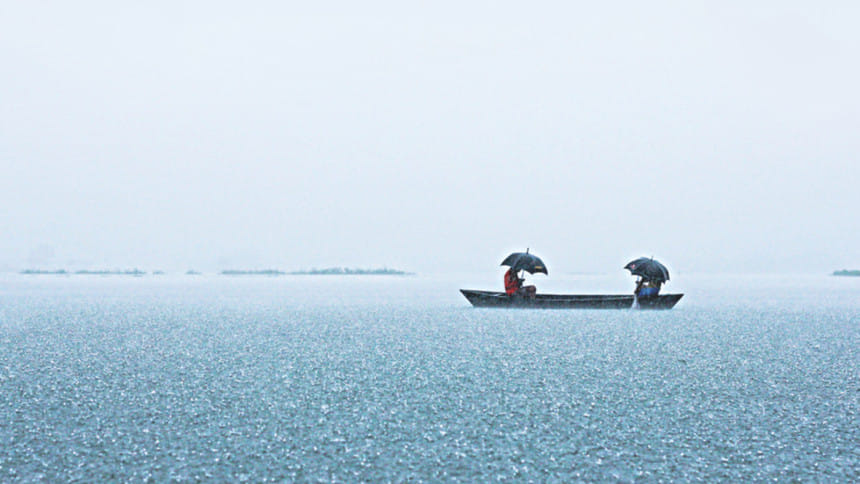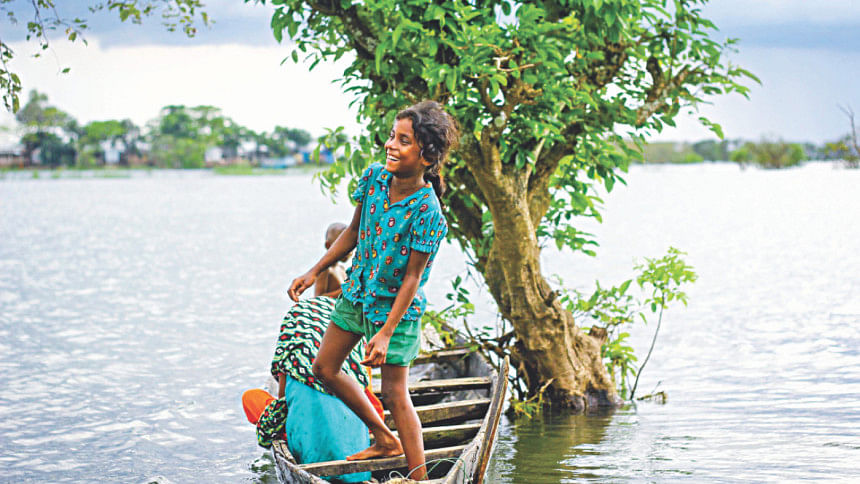How are you Tanguar Haor?

The urgent scratch of a jackal and the whooshing sound of the brewing storm kept me awake for most parts of every night. I would be here for more than a week and as I slept or tried in vain to drift off into the night on the first of many nights, I wondered about my agenda for this trip. I mean, every trip has an agenda, right?
When Ibne Battuta sailed, it was for a pilgrimage; when Columbus did, he did it to find new lands; when an Instagram influencer travels, they do it for the likes. Agendas often get blurred but you end up chancing upon new lands and new adventures anyway. This particular journey to the land of water and rolling hills was something along those lines—where work merged with wistful walks on the banks of the haors, where my lucidity and sanity decided to perform an endless tango or sometimes put up solo dance numbers, where each dusk and dawn was so different from each other, it felt like I had lived a whole life in between.
The detachment from reality began with the journey to Tanguar itself. It took a broken bus coursing through the night, a rickety autorickshaw, a short walk and a long boat ride snaking through the Baulai river to finally get to Golabari. There, we would find a camp, set up in our anticipation on a strip of land, nestled conveniently between a strange oxbow river.
For the foreseeable next few days, I would be living out of a tent. And while the promise of a good adventure always got me riled up, this trip would somehow prove to be different. This was partly because it came at a time in my life when everything was in transition—everything I was familiar with was changing, but the changes were more internal than external. I went there to observe conservationists at work but, all the while, I was trying to escape my own work and responsibilities, to escape into and from myself. I kept hoping this journey would help me make up my mind, feel less fearful of a life on my own. I mean, if I could spend six hours inside a tent, with nothing but my racing thoughts as company, surely, I could survive back in Dhaka on my own? Because nature is supposed to teach us that, right? To live in moments, to survive sunrise to sunsets?
I had romanticised travels for far too long to expect any different, thanks to all the travel books I had indulged in as a child.
I remember vividly, despite my foggy mind, that there was an intensity to seeing Tanguar Haor for the first time. It was the intensity of seeing something new, something that was not focused on my inner turmoil. The somewhat loopy days back in Dhaka had left me feeling blunt. Which must be why I sought the intensity of a newness, something that would convince me I could break a habit. This in part, because I believed what Pico Iyer said: “It is akin to the first kiss, the first date, all the firsts that have an intensity and life disproportionate to their duration; the first moment is worth a thousand others.”

Tanguar Haor was new, enchanting and bewitchingly beautiful. Through the gnarly fingers of the Koroch trees, the ink-black sky poured into the ground. But it also invoked fear in me. The entire landscape was plunged into pitch black darkness by nightfall. Everything would fall silent, only the lone jackal called, the jungle cats howled in unison for a partner and the north wind kept on billowing. As I adjusted my eyes to the darkness, I would be treated to the magic of the haor, flooded under the half-baked moon.
For miles, as far as my eyes could see, the grass fields went on and on until a break in the land introduced a narrow river. In the cold of the night, the river appeared as though full of black, inky liquid, only slightly disturbed by the breeze.
And in the eerie quiet of those nights, I would make my way into my blue tent to settle down for the night. A whole day of rowing out into the wild, counting birds, eating picnic lunches on soft grass, taking showers in the stark clear water of the river, would somehow still tire me more, rather than replenish my spirits. Rather than give me answers, the wild left me more bewildered. I had just been put on anti-depressants back in the city and now, here, in the wilderness, I searched frantically for my missing medicines. But in vain. As my mind crumbled, so did my perception of how I viewed nature. It appeared more and more out of control. The gnarly fingers of the trees appeared to me as though they were wailing for help, their branches sighing in exasperated despair.
Nights would go by like this. Each night would be another battlefield inside the zigzag neuron network of my mind, as an early February storm thrashed the flimsy walls of my tent. On the nights the storm was the strongest and loudest, so too were my thoughts. The thoughts raced with the wind, thinking of how my relationship was nearing its end, how helpless the end would feel, how confused I still was. There was one night, when the north wind blew the hardest, and a soaking wet jungle cat meowed in broken peals for some shelter. Inside, I tossed and turned; and through the somewhat opaque tent window I looked out into the haor—the vast, green emptiness—and saw the moon wash over it. On the good nights in the wild, I would find myself drifting off to sleep very quickly and easily. Much like how the orange leaves rustled and fell off, brushing against the plastic skin of my tent. On those days, the haor was mostly quiet, minus the occasional breeze and the hoot of a barn owl, breaking the silence of the night. In the especially silent nights, my mind would also whir a little less. It slowed to match the breeze, calm for a while until worries of career plans, passions versus pragmatism made sudden uninvited appearances.
The haor synced its routine with mine. We both woke up around the same time, though sometimes I would run a little late. Most mornings I sat and watched the sun break out on the plains ahead of me, reflect off of the blue water and make my eyes squint at the sudden brightness. These particularly sunny mornings would leave me reeling further into my mind. Once gazing inward, I would think back on Iyer’s lines: “We travel, then, in part just to shake up our complacencies by seeing all the moral and political urgencies, the life-and-death dilemmas, that we seldom have to face at home.”
The haor managed to shake me from my complacency. There were many wonderful moments in between my raving descent to madness. I remember the walks on uneven mounds, watching fishermen in pink shirts float by, silently gliding through the water. I ate elaborate lunches with the conservationists. They talked of their days on the field, the perceived romanticism of a life in the wild against the very real loneliness of being away from home and family. Sometimes, when the conservationists had a good day, they would talk excitedly, animatedly of new conservation plans but on the bad ones, the conversations would often turn to the depressive realities of an anthropocentric world, where every action is decided based on economic value. My time, spent in the confines of one landscape and watching it change so violently every day, only to keep reverting back to its old forms, comforted me. I spent many an evening in the haor, watching the sun set, and made friends with a girl named Hadisa. She was the most boisterous of the lot and would follow me around, singing out of tune songs and eating sugary treats. Some days, I would climb upon the watchtower, and look out on the entire landscape. Small villages stood on one side of the river. Men played carom board at the small shops by the village. A small locality was growing up around the watchtower. The people who have been visiting this area for many years told me how the shops came here only recently. But now the shops were growing, so were its customers. The electricity lines would come soon too. And watching on from the tower, I thought of the inevitability of change. I watched the sun set, turning the entire landscape a crimson gold. It was during these times, watching nature’s golden sunsets, that I relearned (little by little) to appreciate the beauty of stillness, and of endings.
When I started this trip, I went with a foggy mind and returned with one even foggier. Maybe, that’s what great journeys do to you. They take you on an inward journey too, sometimes into thickets in the jungle, where everything is a little hazy, a little unclear.
“Journeys show us the sights and values and issues that we might ordinarily ignore; but it also, and more deeply, shows us all the parts of ourselves that might otherwise grow rusty. And this strange descent into madness while being out in the wilderness has taken me into moods and states of mind and hidden inward passages that we’d otherwise seldom have cause to visit.”

 For all latest news, follow The Daily Star's Google News channel.
For all latest news, follow The Daily Star's Google News channel. 



Comments